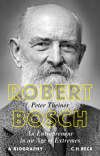Robert Bosch
An Entrepreneur in an Age of Extremes
Zusammenfassung
Robert Bosch (1861 - 1942) was one of the most successful German entrepreneurs and philanthropists of the 20th century and, at the same time, a pioneer of the social market economy. This book presents a comprehensive and impressive biography of a visionary who thought far ahead of his time like almost no other. Peter Theiner follows the traces of this trailblazer of modernity who founded a global company.
1886, Robert Bosch opened his Werkstätte für Feinmechanik und Elektrotechnik, today’s Robert Bosch GmbH, in a modest rear building. Pioneering innovations for motorized vehicles emerged from the young company, and Bosch was quickly able to point to tremendous international successes as an industrialist. Today, his name represents the rise of motor vehicles and electricity in the home. In addition, he also had an impact as a benefactor and philanthropist with a well-developed political profile and a strong sense of social responsibility. In a time of wars and upheaval, in an age of extremes, Bosch positioned himself as a staunch Democrat who cut against the grain of German history.
Abstract
Robert Bosch (1861 - 1942) was one of the most successful German entrepreneurs and philanthropists of the 20th century and, at the same time, a pioneer of the social market economy. This book presents a comprehensive and impressive biography of a visionary who thought far ahead of his time like almost no other. Peter Theiner follows the traces of this trailblazer of modernity who founded a global company.
1886, Robert Bosch opened his Werkstätte für Feinmechanik und Elektrotechnik, today’s Robert Bosch GmbH, in a modest rear building. Pioneering innovations for motorized vehicles emerged from the young company, and Bosch was quickly able to point to tremendous international successes as an industrialist. Today, his name represents the rise of motor vehicles and electricity in the home. In addition, he also had an impact as a benefactor and philanthropist with a well-developed political profile and a strong sense of social responsibility. In a time of wars and upheaval, in an age of extremes, Bosch positioned himself as a staunch Democrat who cut against the grain of German history.
- Kapitel Ausklappen | EinklappenSeiten
- 1–8 Titelei/Inhaltsverzeichnis 1–8
- 9–13 Preface 9–13
- 13–92 I: Heritage and Rise 13–92
- 13–15 Württemberg prior to industrialization 13–15
- 15–20 Family life and political culture 15–20
- 20–29 Education and life world 20–29
- 29–39 Travels and reforms 29–39
- 39–46 Take off, company founding, and a "chokehold" 39–46
- 46–56 Successes, expansion, and internationalization 46–56
- 56–64 Modernization and social policies 56–64
- 64–69 Social policies at Bosch 64–69
- 69–76 Civic pride and patronage 69–76
- 76–82 A backlog of reforms, Taylorism, and a strike 76–82
- 82–92 No conversion and a Liberal encyclopedia 82–92
- 92–165 II: The Great War 92–165
- 92–97 Mobilization and the "Spirit of 1914" 92–97
- 97–106 Anger and restraint 97–106
- 106–127 Great hardship and philanthropic foundations 106–127
- 127–138 The meaning and aims of the war 127–138
- 138–141 The German National Committee 138–141
- 141–148 "Mitteleuropa " 141–148
- 148–154 Peace resolution and the fall of the chancellor 148–154
- 154–156 A memorandum before the last offensive 154–156
- 156–158 Thinking beyond the war: The German College for Political Science 156–158
- 158–165 The bursting of the "bubble" 158–165
- 165–254 III: In the Weimar Republic 165–254
- 165–170 No system change without free elections 165–170
- 170–173 The Democratic Popular Union 170–173
- 173–187 Councils, socialization, and company statutes 173–187
- 187–190 The company and the effects of the war 187–190
- 190–192 Setting the course for corporate governance 190–192
- 192–199 New approaches to company communications 192–199
- 199–202 Social policies in the firm 199–202
- 202–211 Searching for peace 202–211
- 211–222 Change through rapprochement and European integration 211–222
- 222–228 Seeking an end to the "stereotypical Frenchman" 222–228
- 228–238 Crisis, renewal, and securing the company's future 228–238
- 238–254 For the republic and international understanding 238–254
- 254–385 IV: Dictatorship, Building up Armaments, and Resistance 254–385
- 254–260 The transfer of power 254–260
- 260–265 A "wall of protection" for the firm 260–265
- 265–273 "Enforced conformity" and illusions 265–273
- 273–287 Armaments boom and concerns 273–287
- 287–288 Motives for resistance 287–288
- 288–292 The end of liberal adult education and the independent media 288–292
- 292–301 The company, the "Nazi wave"– an anniversary and the Bosch-Zünder 292–301
- 301–305 A new clinic 301–305
- 305–315 Bosch and his Jewish fellow citizens 305–315
- 315–327 In the maelstrom of the war economy 315–327
- 327–335 Still for peace and cooperation 327–335
- 335–346 The Bosch-Goerdeler connection 335–346
- 346–381 Business as a cover for resistance 346–381
- 381–385 A state funeral for Bosch 381–385
- 385–403 Epilogue 385–403
- 385–392 Forced labor at Bosch and late compensation for the victims 385–392
- 392–399 Conspiracy, failure, and late honor 392–399
- 399–403 The decision to create the Robert Bosch Foundation 399–403
- 403–507 Appendices 403–507
- 403–405 Acknowledgments 403–405
- 405–470 Notes 405–470
- 470–472 List of Abbreviations 470–472
- 472–473 Archives 472–473
- 473–474 Newspapers and Periodicals 473–474
- 474–501 Printed Sources and Literature 474–501
- 501–507 Index of Persons 501–507
- 507–507 About the author 507–507


